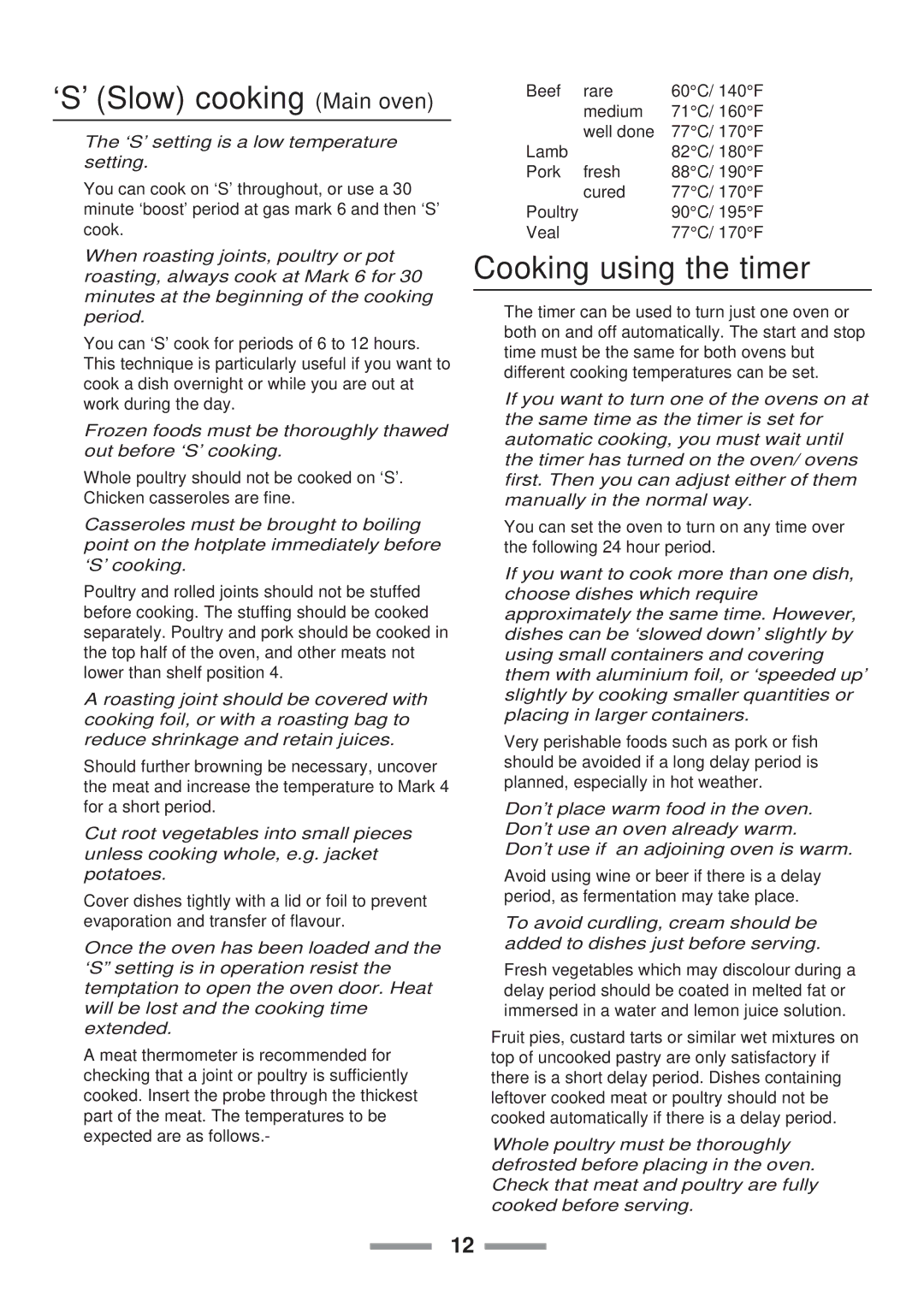
‘S’ (Slow) cooking(Main oven)
The ‘S’ setting is a low temperature setting.
You can cook on ‘S’ throughout, or use a 30 minute ‘boost’ period at gas mark 6 and then ‘S’ cook.
When roasting joints, poultry or pot roasting, always cook at Mark 6 for 30 minutes at the beginning of the cooking period.
You can ‘S’ cook for periods of 6 to 12 hours. This technique is particularly useful if you want to cook a dish overnight or while you are out at work during the day.
Frozen foods must be thoroughly thawed out before ‘S’ cooking.
Whole poultry should not be cooked on ‘S’. Chicken casseroles are fine.
Casseroles must be brought to boiling point on the hotplate immediately before ‘S’ cooking.
Poultry and rolled joints should not be stuffed before cooking. The stuffing should be cooked separately. Poultry and pork should be cooked in the top half of the oven, and other meats not lower than shelf position 4.
A roasting joint should be covered with cooking foil, or with a roasting bag to reduce shrinkage and retain juices.
Should further browning be necessary, uncover the meat and increase the temperature to Mark 4 for a short period.
Cut root vegetables into small pieces unless cooking whole, e.g. jacket potatoes.
Cover dishes tightly with a lid or foil to prevent evaporation and transfer of flavour.
Once the oven has been loaded and the ‘S” setting is in operation resist the temptation to open the oven door. Heat will be lost and the cooking time extended.
A meat thermometer is recommended for checking that a joint or poultry is sufficiently cooked. Insert the probe through the thickest part of the meat. The temperatures to be expected are as follows.-
Beef | rare | 60°C/ 140°F |
| medium | 71°C/ 160°F |
| well done | 77°C/ 170°F |
Lamb |
| 82°C/ 180°F |
Pork | fresh | 88°C/ 190°F |
| cured | 77°C/ 170°F |
Poultry |
| 90°C/ 195°F |
Veal |
| 77°C/ 170°F |
Cooking using the timer
The timer can be used to turn just one oven or both on and off automatically. The start and stop time must be the same for both ovens but different cooking temperatures can be set.
If you want to turn one of the ovens on at the same time as the timer is set for automatic cooking, you must wait until the timer has turned on the oven/ ovens first. Then you can adjust either of them manually in the normal way.
You can set the oven to turn on any time over the following 24 hour period.
If you want to cook more than one dish, choose dishes which require approximately the same time. However, dishes can be ‘slowed down’ slightly by using small containers and covering them with aluminium foil, or ‘speeded up’ slightly by cooking smaller quantities or placing in larger containers.
Very perishable foods such as pork or fish should be avoided if a long delay period is planned, especially in hot weather.
Don’t place warm food in the oven. Don’t use an oven already warm. Don’t use if an adjoining oven is warm.
Avoid using wine or beer if there is a delay period, as fermentation may take place.
To avoid curdling, cream should be added to dishes just before serving.
Fresh vegetables which may discolour during a delay period should be coated in melted fat or immersed in a water and lemon juice solution.
Fruit pies, custard tarts or similar wet mixtures on top of uncooked pastry are only satisfactory if there is a short delay period. Dishes containing leftover cooked meat or poultry should not be cooked automatically if there is a delay period.
Whole poultry must be thoroughly defrosted before placing in the oven. Check that meat and poultry are fully cooked before serving.
12
